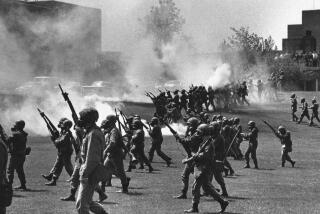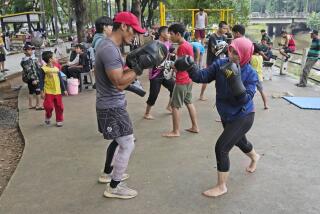Indonesia Student Killings Bring Symbol to Protests
- Share via
JAKARTA, Indonesia — The police killings of six young protesters at an elite private college has turned Trisakti University into the Kent State of Indonesia, giving students here a focus and a symbol in their cries for revolutionary change, if not revolution.
“Something like this can be the embryo of real change,” economics professor Avendi Simangunsong said Wednesday, as students wearing black armbands eulogized fallen friends and chanted for the end of President Suharto’s 32-year rule.
All day, national luminaries made their way through street crowds to the campus to express their shock at Tuesday’s killings. Among them were Megawati Sukarnoputri, daughter of Indonesia’s founding father, Sukarno; popular Muslim leader Amien Rais; and the nation’s poet laureate, W. S. Rendra.
All urged restraint on both sides, but violence continued. At Trisakti, students hurled rocks at the security forces ringing the campus. The police responded with tear gas. Protesters on Wednesday evening looted and burned stores owned by ethnic Chinese in the Kota neighborhood, three miles from the university. Security forces made no attempt to stop the mob, which appeared to include more poor and unemployed than students.
Fresh riots broke out this morning, and black smoke was reported billowing out of the city’s center as more shops and vehicles were set ablaze.
Western diplomats said the situation was fast spinning out of control. The State Department was preparing to issue a travel advisory, warning U.S. citizens to avoid Indonesia, and announce plans to send home from Jakarta nonessential U.S. Embassy employees and dependents, a Western source said.
The moves were likely to snowball, with other industrial countries following suit. The result, bankers said, will be devastating to the Indonesian economy, already crippled by a lack of investor confidence. The local currency, the rupiah, on Wednesday plunged 14%, and the stock market fell 6% over the previous day.
Even as capitals from Washington to Canberra, Australia, condemned the violence that led to the students’ deaths, it remained unclear who gave security forces the order to fire, who did the actual shooting and whether police used “rubber” bullets or live ammunition.
But clearly the shootings upped the ante in the increasingly violent standoff between protesters and the armed forces. The six were the first students to die in nationwide demonstrations that have gone on for three months. Four other people--two rioters in Medan, an undercover police officer and a bystander--also have been killed.
“I think the students have been emboldened and are past the threshold of fear,” said Marzuki Darusman, vice chairman of the National Commission on Human Rights. “They needed more concrete issues than price increases to press demands for reform, and now they have one.”
Suharto, 76, on a weeklong official visit to Egypt, was due to return home Saturday but might cut short the trip, aides said. Western analysts began saying for the first time that his days in office may be numbered.
“The opportunity for a gradual change from within has passed,” said Jeffrey Winters, a Northwestern University expert on Indonesian affairs.
One of the odd twists to Suharto’s predicament is that among his proudest achievements is the creation of an excellent educational system in which 2.5 million students are enrolled in 1,400 universities. He is said to be perplexed that the very people to whom he offered opportunity are turning against him.
But with a family fortune estimated at $40 billion, Suharto’s bromides--how he understands the public concern with rising prices because he was once poor--fall on deaf ears.
By the standards of the Vietnam War-era protests in the United States--such as the 1970 disturbance quashed by National Guard troops who killed four students and wounded eight at Kent State in Ohio--the demonstrations by Indonesian students have been moderate. The students don’t rely on fiery rhetoric. They have no free speech partisan Mario Savio or black militant Bobby Seale to energize them.
Their one issue--political reform--is a fuzzy concept lacking the galvanizing effect of the Vietnam War.
But the students already have brought about political debate unimaginable in Indonesia just a few years ago.
Five anti-government student newspapers are flourishing on campuses; that the Ministry of Information doesn’t simply close them down may say something about where bureaucrats’ sentiments lie. Mainstream newspapers, meanwhile, give prominence to demonstrations and calls for new national leadership. People voice opinions about Suharto without whispering.
“Five years ago, if you even mentioned politics, people’s eyes got wide and they’d walk away,” said Geoffrey Comben, an Australian risk analyst who has lived in Indonesia for eight years. “Now politics is all they want to talk about. The reality remains, though, that until real opposition leadership emerges, the only force in Indonesia that really counts is the military, and there can be no true political reform without the military’s consent.”
Traditionally, the approximately 450,000-member armed forces--which include about 195,000 police--have served a dual function known as dwifungsi: to protect against external attack and internal subversion and to provide political equilibrium. Though uncompromisingly tough and sometimes brutal, the military has not been used, as a matter of official policy, to repress Indonesia’s 200 million people.
“Considering the size of Indonesia, the army is not large,” said Bruce Gale, a risk analyst in Singapore. “If there were a national uprising, the army couldn’t control it.”
Despite the military excesses, most Indonesians view the armed forces favorably. The military led the fight for independence in the 1940s and united with students in the mid-1960s to topple the unpopular Sukarno regime. The military is still considered the country’s most cohesive national institution.
Gen. Wiranto, commander of Indonesia’s military, and his senior officers appear loyal to Suharto. But it is not inconceivable, analysts said, that at some point they could align themselves with the reformers, placing the interests of the state ahead of those of the president.
Where there may be friction, military attaches said, is between Wiranto and Suharto’s son-in-law, Lt. Gen. Prabowo Soemitro Subianto. Disliked by fellow officers and the public, the three-star general is known to consider himself a post-Suharto presidential candidate.
As chief of the Strategic Reserves Command, a sort of elite presidential guard of 27,000 troops, the 46-year-old Prabowo is widely suspected of involvement with kidnapping activists and encouraging disturbances that led to attacks on shops owned by ethnic Chinese, human rights officials said.
More to Read
Sign up for Essential California
The most important California stories and recommendations in your inbox every morning.
You may occasionally receive promotional content from the Los Angeles Times.










